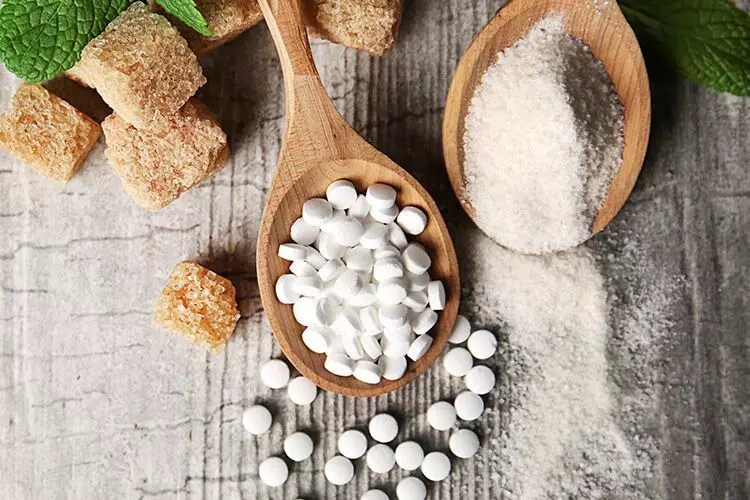The myth of artificial sweeteners: WHO warns of adverse side effects
Artificial sweeteners include all synthetic and naturally occurring or modified non-nutritive sweeteners that are not classified as sugars found in manufactured foods and beverages
By Sulogna Mehta
Hyderabad: Contrary to the popular belief that non-sugar sweeteners (NSS) or artificial sweeteners are safe and beneficial, especially for those trying to lose weight or control non-communicable diseases (NCDs), the World Health Organisation (WHO) has recently released a new guideline against the use of NSS to control body weight or reduce the risk of NCDs.
No benefits, long-term adverse effects
The WHO recommendation is based on the findings of a systematic review of the available evidence, which suggests that use of NSS does not confer any long-term benefit in reducing body fat in adults or children. Results of the review also suggest that there may be potential undesirable effects from long-term use of NSS, such as an increased risk of Type 2 diabetes, cardiovascular diseases, and mortality in adults.
NSS have been developed as an alternative to sugars and are widely used both as an ingredient in pre-packaged foods and beverages and added to food and beverages directly by the consumer. Individual NSS undergo toxicological assessment by the Joint FAO-WHO Expert Committee on Food Additives (JECFA) and other authoritative bodies to establish safe levels of intake.
Results of randomised controlled trials have generally suggested NSS may have little impact on glucose metabolism and result in lower body weight when coupled with energy restriction in the short-term, there is no clear consensus on whether non-sugar sweeteners are effective for long-term weight loss or maintenance.
“Replacing free sugars with NSS does not help with weight control in the long term. People need to consider other ways to reduce free sugar intake, such as consuming food with naturally occurring sugars, like fruit, or unsweetened food and beverages,” says WHO director for nutrition and food safety Francesco Branca.
“NSS are not essential dietary factors and have no nutritional value. People should reduce the sweetness of the diet altogether, starting early in life, to improve their health,” she says.
Diabetics exempted from recommendations
The recommendation against its usage applies to all people except individuals with pre-existing diabetes. The recommendation does not apply to personal care and hygiene products containing NSS, such as toothpaste, skin cream, and medications, or to low-calorie sugars and sugar alcohols (polyols), which are sugars or sugar derivatives containing calories and are therefore not considered NSS.
Products containing NSS
Artificial sweeteners include all synthetic and naturally occurring or modified non-nutritive sweeteners that are not classified as sugars found in manufactured foods and beverages, or sold on their own to be added to foods and beverages by consumers. Common NSS include acesulfame K, aspartame, advantame, cyclamates, neotame, saccharin, sucralose, stevia, and stevia derivatives.
Conditional recommendations requiring further discussions
The WHO recommendation has been assessed as conditional, following WHO processes for developing guidelines. This indicates that policy decisions based on this recommendation may require substantive discussion in specific country contexts.
The WHO guideline on NSS is part of a suite of existing and forthcoming guidelines on healthy diets that aim to establish lifelong healthy eating habits, improve dietary quality, and decrease the risk of NCDs worldwide.
Sugar consumption for healthy people
Referring to the WHO recommendation against the use of NSS, Dr Rajeev Jayadevan, gastroenterologist and former president of Indian Medical Association (IMA), Kochi, says, “Since long-term use of non-sugar substitutes is linked to adverse outcomes like weight gain, cardiovascular diseases, and diabetes, it is best that healthy people avoid regularly using these substitutes. They may consume normal sugar if required but in limited quantities. Also, they should opt for a healthy and active lifestyle, which includes eating a balanced diet and avoiding excess of sugar, salt, and ultra-processed foods.”
Diabetics can use NSS
“For people with pre-existing diabetes, WHO doesn’t recommend discontinuation of NSS as it does not seem to cause them any extra harm. They should tailor their diet as per the advice of their doctors and dieticians and try to eat locally available food prepared at home,” adds Dr Rajeev.
Myth busted
Popular beliefs and health taglines that dates, jaggery, and honey can be natural and beneficial substitutes to refined sugar is a myth, according to Dr Rajeev.
“All these natural sweeteners have no distinct advantage over refined table sugar and are all loaded with sugars. While glucose and fructose make honey and dates sweet, jaggery and brown sugar contain the same sucrose as in table sugar,” he explains.
“In India, it is often taken for granted that anything natural or herbal is completely safe and without side effects, which is a myth. For example, one of the world’s deadliest poisons is found in the fruit of the tree called cerbera odollam, commonly called the suicide tree in India. Also, a fruit called Irumban Puli, used in preparing curries, especially in Kerala, can cause kidney failure,” avers the doctor and adds that even brown colour sugar and molasses are not any better than usual refined sugar despite the positive notion about them.
“It is true that honey and dates have other ingredients that are not found in table sugar, but as far as sugar content goes, they are not a healthy table sugar substitute,” he says.